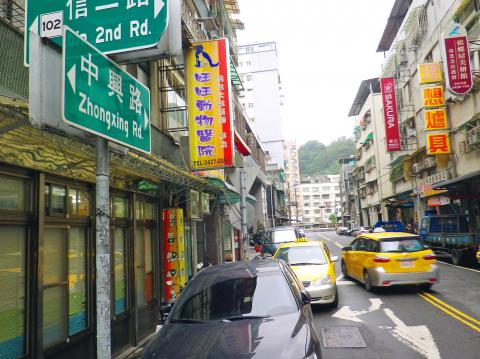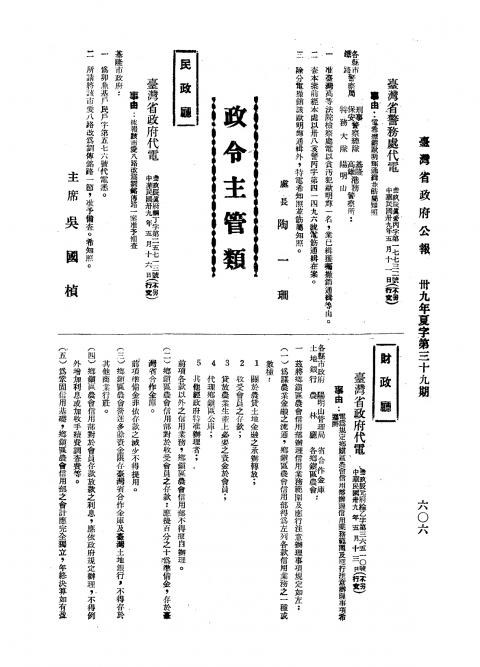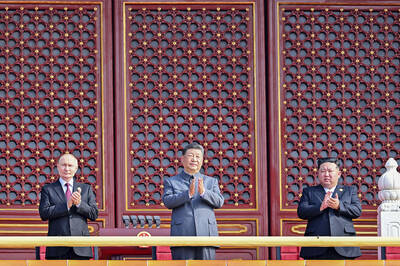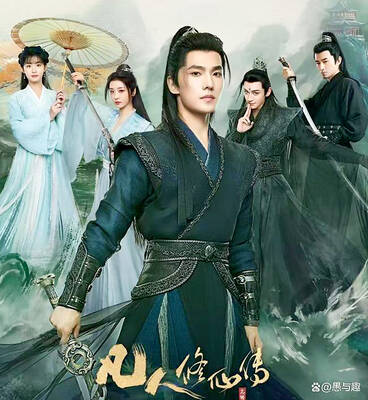In the Japanese era, roads in Keelung were called “ding.” After World War II ended, roads were named after the “eight virtues,” namely zhong (loyalty), xiao (filial piety), ren (benevolence), ai (love), xin (honesty), yi (righteousness), he (peace) and ping (equality). Roads that were named after love ranged from Ai First Road to Ai Ninth Road, and roads named after righteousness ranged from Yi First Road to Yi Tenth Road.
However, Keelung’s Renai District today only has Ai Seventh Road and Ai Ninth Road but no Ai Eighth Road, because it has been replaced by Lau-ming-thuan Road. There is no Yi Eighth Road either, because it was replaced by Zhongxing Road. Huang Jen-hsiang, a man in his eighties and a retired director-general of the department of social affairs of the Keelung City Government, recounted the history and revealed the secret when he took part in the city government’s 70th anniversary of establishment on Nov. 3.
As it turns out, when the Chinese Nationalist Party (KMT) fled to Taiwan in 1949, it was particularly sensitive to the Chinese Communist Party’s (CCP) Eighth Route Army and so ordered that Keelung must not have any “eighth road.” As a consequence, on May 1950, Ai Eighth Road was renamed to Lau-ming-thuan Road, while Yi Eighth Road was renamed to Zhongxing Road. The young generation today think it is odd it, but they do not know the history.

Photo: Lu Hsien-hsiu, Liberty Times
照片: 自由時報記者盧賢秀攝
Huang said that he started working in the Keelung City Government in 1962. He then heard senior colleagues say that the director of the department of civil affairs at the time, surnamed Lin, who was in charge of naming the roads, was given a demerit and was transferred because of it, which they thought was really unfair.
Li Cheng-jen, a Keelung historian, said he heard older people say “Ai Eighth Road” quite frequently; even after it was renamed, they were still used to call it that by that name. However, not only roads should avoid being having the word “eighth” in their name, there also could not be any bus route no 8. (Liberty Times, translated by Ethan Zhan)
基隆市街道日治時代都稱「町」,二次戰後,街道才改名,以「八德」的忠、孝、仁、愛、信、義、和、平來命名。其中愛字路從愛一路編到愛九路,義字路則從義一路編到義十路。

Photo: Lu Hsien-hsiu, Liberty Times
照片:自由時報記者盧賢秀攝
但是現在仁愛區只有愛七路、愛九路,沒有愛八路,因為被改成劉銘傳路;也沒有義八路,因為被改成中興路。年屆八旬的基隆市政府退休社會處長黃仁祥十一月三日參加基隆市政府七十周年府慶時「講古」揭密。
原來民國三十八年時國民黨退守台灣,對中國共產黨「八路軍」很敏感,要求基隆不能有「八路」,於是民國三十九年五月愛八路就改為劉銘傳路,義八路就改為中興路。現代年輕人只覺得很奇怪,卻不知有這段歷史。
黃仁祥說,他民國五十一年到基隆市政府工作,還聽市府前輩說,承辦編定路名的民政課林姓股長,還因此被記過調職,市府的前輩為他抱不平。
基隆文史工作者李正仁說,常聽長輩說「愛八路」,即使改名之後,還是習慣稱愛八路。然而,不僅路名避用「八路」,連公車也不能有「八路」。
(自由時報記者盧賢秀/基隆報導)

China commemorated 80 years since the end of World War II last week with a massive military parade against a backdrop of a disputed history about who ultimately defeated Japan. The issues, including Japan’s reckoning with its wartime record in China, are bound to flare again in December, a flashpoint anniversary of the mass killing in Nanjing by invading Japanese troops. Below is an explainer about what the different — and disputed — points of view are. WHAT IS CHINA’S VIEW? For the Chinese government sitting in Beijing, this is a clear-cut issue: China sacrificed 35 million people in a heroic and brutal struggle

Rarely does Nature present such a striking contradiction as the one found in Lencois Maranhenses National Park. Located along Brazil’s northeastern coast, the park unveils breathtaking scenery, where rippling sands meet crystal-clear lagoons. Under the sun’s golden glow, the waters glitter in shades of turquoise and emerald. So surreal is this spectacle that visitors might wonder if they’re gazing at a digitally modified photo rather than a living landscape. Were it not for the unique geographical and climatic conditions, such a marvel would not exist. Unlike typical deserts, Lencois Maranhenses receives a substantial amount of rainfall, particularly during the rainy season

A: Wow, animated fantasy film “KPop Demon Hunters” (KDH) has become Netflix’s most viewed film ever. B: Isn’t that the movie about a K-pop girl group secretly serving as demon hunters? A: Yeah, and its theme song “Golden” was No. 1 on the Billboard chart. B: The hit performed by HUNTR/X — the girl group from KDH — has inspired a “Golden challenge,” as celebrities are racing to cover its sky-high notes. A: Cool, let’s try it out. A: 哇,動畫電影《KPop獵魔女團》近日已成為網飛上觀看次數最多的電影。 B: 這部電影不是關於某韓流女團,成員秘密擔任惡魔獵人的故事? A: 對,主題曲《Golden》更勇奪告示牌單曲榜冠軍呢! B: 該曲由電影中的女團「HUNTR/X」所演唱,甚至還掀起一股全球《Golden》大挑戰︰一堆名人挑戰翻唱該曲飆高音。 A: 酷喔我們也來挑戰吧。(By Eddy Chang, Taipei Times/台北時報張迪)

A: Apart from megahit “KPop Demon Hunters,” what else is worth watching? B: The new shows featuring four top-tier actors – Xiao Zhan, Wang Yibo, Yang Yang and Li Xian — are all popular. A: Yang’s TV drama, “The Immortal Ascension,” is definitely one of the summer sizzlers. Some praise it as the Eastern edition of the glorious “Harry Potter” series. B: Yeah, the costume fantasy drama is about a young man’s journey to immortality. All the magic powers and magical tools in the show are just stunning. A: Let me go stream it now. I wanna